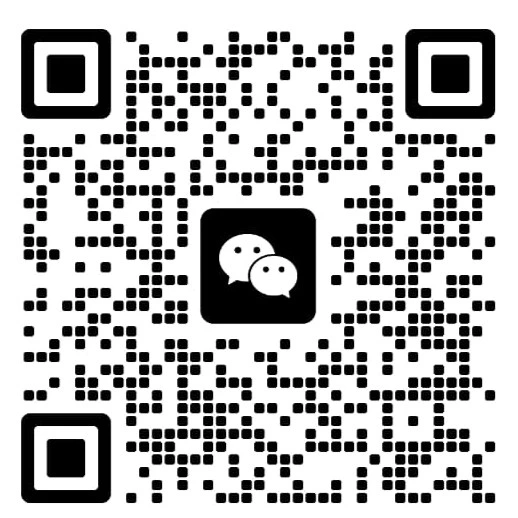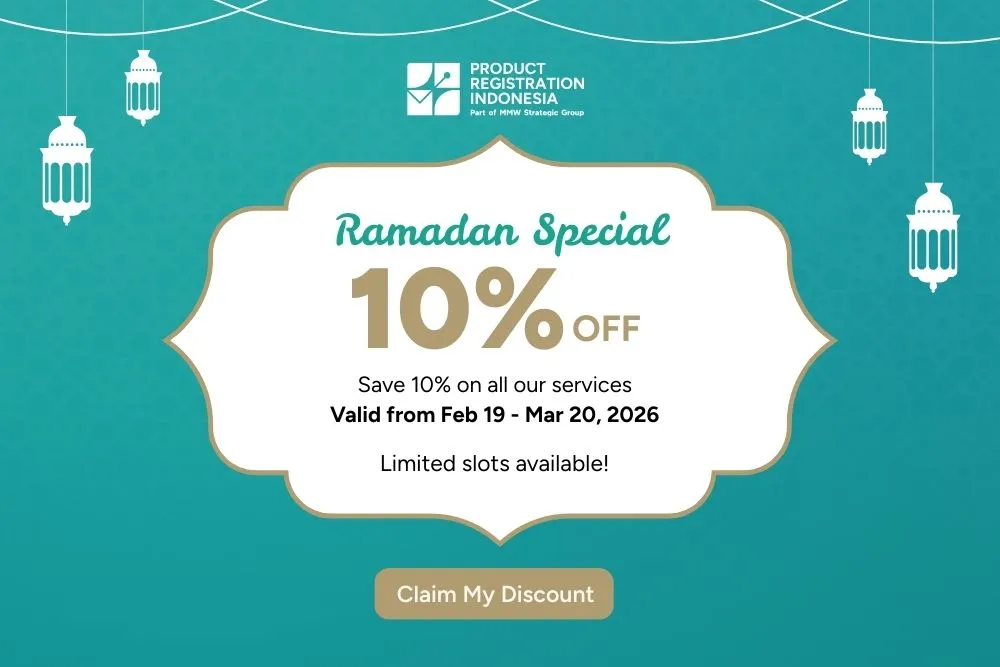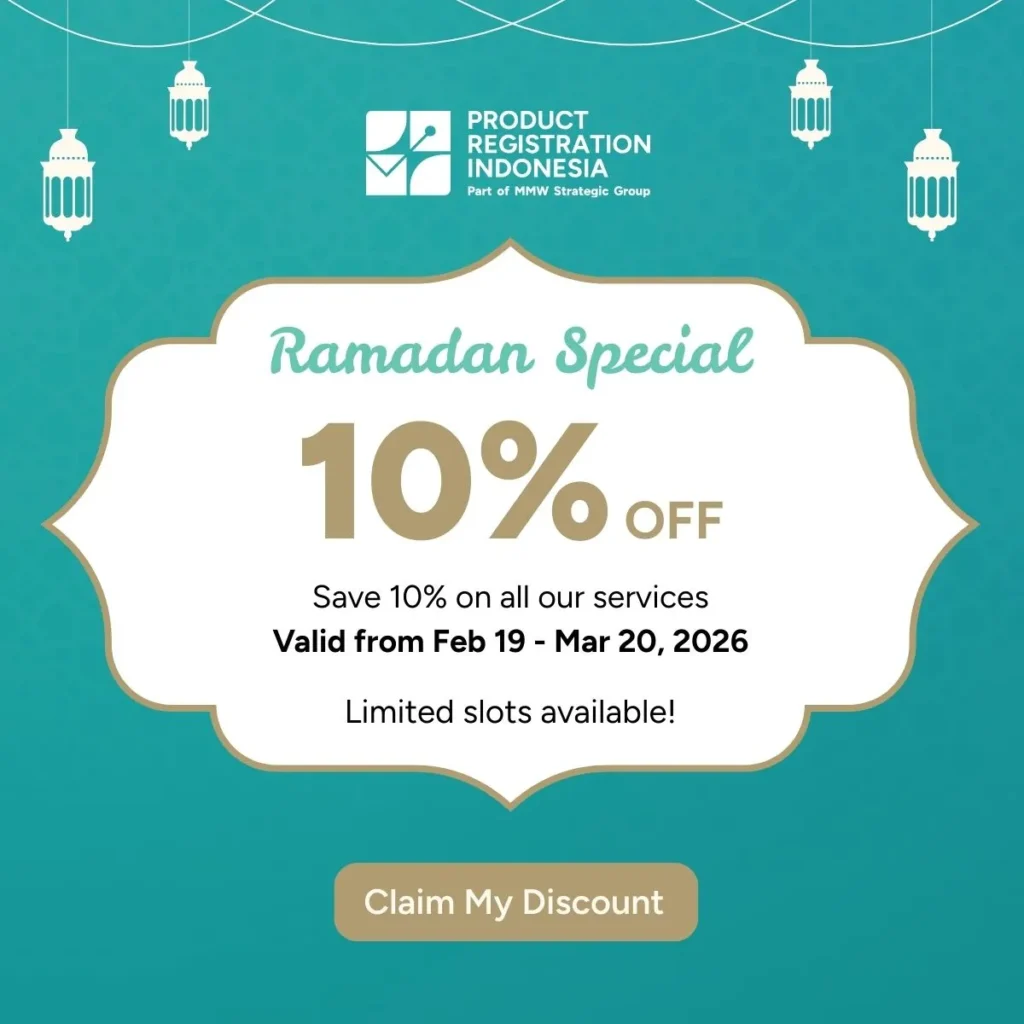A Comprehensive Guide to Household Product Registration in Indonesia
Indonesia’s growing population of over 270 million people, coupled with rapid urbanization, presents a lucrative opportunity for businesses in the household product sector. The increasing demand for cleaning agents, disinfectants, and environmentally friendly products has created a favourable environment for exporters. Companies aiming to tap into this market can leverage the following advantages:
Case Study: Demand for Green and Eco-Friendly Products
A recent surge in consumer awareness around environmental sustainability has significantly influenced purchasing behaviours in Indonesia. For example, eco-friendly cleaning products that meet biodegradability standards and avoid harmful chemicals have gained traction among urban households and businesses. Exporters that align their products with such preferences can enjoy heightened market acceptance and brand loyalty.
Success Stories of International Brands
International brands such as Unilever and P&G have effectively navigated Indonesia’s regulatory landscape, establishing themselves as household names by adhering to BPOM and Ministry of Health regulations and aligning with local cultural preferences. These companies have demonstrated that with proper compliance and strategic localization, foreign brands can thrive in Indonesia’s competitive market.
Free Trade Agreements and Economic Zones
Indonesia’s participation in various free trade agreements, such as the ASEAN Free Trade Area (AFTA), offers reduced tariffs for imports, making the country an attractive destination for exporters. Additionally, Indonesia’s push for foreign investments in Special Economic Zones (SEZs) facilitates easier distribution and manufacturing, further easing entry for international businesses.
By understanding market trends, focusing on regulatory compliance, and leveraging favourable trade policies, exporters can position their products successfully in Indonesia’s growing household product market.
This guide explores the step-by-step process, documentation requirements, legal and permit details, costs, and timelines associated with household product registration in Indonesia, especially disinfectants, cleaning agents, and alike.
Process and Requirements for Registering Household Products in Indonesia
Registering household products in Indonesia is a critical step for businesses aiming to legally market their products while complying with Indonesian regulatory requirements. Governed by the Ministry of Health, this process ensures that household products meet safety, quality, and environmental standards. This article details the step-by-step registration process, required documentation, timelines, costs, and the reasons the Ministry of Health oversees this regulatory framework rather than the National Agency of Drug and Food Control (BPOM).
Categories of Household Products
Household products subject to registration include a variety of items used in everyday life. Key categories include:
- Cleaning Agents: Detergents, polishes, and all-purpose cleaners.
- Disinfectants: Products designed to kill or inhibit microbial growth, such as antiseptics and sanitizers.
- Air Fresheners: Aerosols, gels, and sprays designed to improve indoor air quality.
- Baby Products: Items such as diapers, baby wipes, and bottle cleaners.
- Kitchen and Laundry Supplies: Dishwashing liquids, fabric softeners, and stain removers.
Each product category has specific safety, quality, and environmental standards to ensure consumer safety and ecological sustainability.
Why Does Household Product Registration Fall Under the Ministry of Health?
The Ministry of Health oversees household product registration rather than BPOM due to the broader health implications of these products, which may not directly affect food or drug safety but can significantly impact public health through:
1. Direct Consumer Interaction
Household products, such as disinfectants and cleaning agents, often come into contact with skin, respiratory systems, and living environments. The Ministry of Health regulates these products to ensure they do not pose risks such as allergic reactions, respiratory issues, or long-term health problems from chemical exposure.
2. Public Health and Hygiene
The role of these products in maintaining public health and hygiene is critical. Disinfectants, for instance, are essential in controlling the spread of infectious diseases. Oversight by the Ministry of Health aligns these products with public health initiatives.
3. Environmental and Waste Management Concerns
Household products often involve chemicals that can affect water quality, soil health, and air pollution when improperly used or disposed of. The Ministry of Health evaluates these environmental impacts to mitigate risks to both public health and ecosystems.
4. BPOM’s Focus Areas
BPOM primarily regulates food, drugs, cosmetics, and medical devices, focusing on ingestion and application to the human body. Household products, which do not fall under these categories, are more appropriately governed by the Ministry of Health due to their impact on overall living environments and indirect health outcomes.
By managing household product registration, the Ministry of Health ensures that these products are evaluated for safety, efficacy, and environmental impact in alignment with its public health mandate.
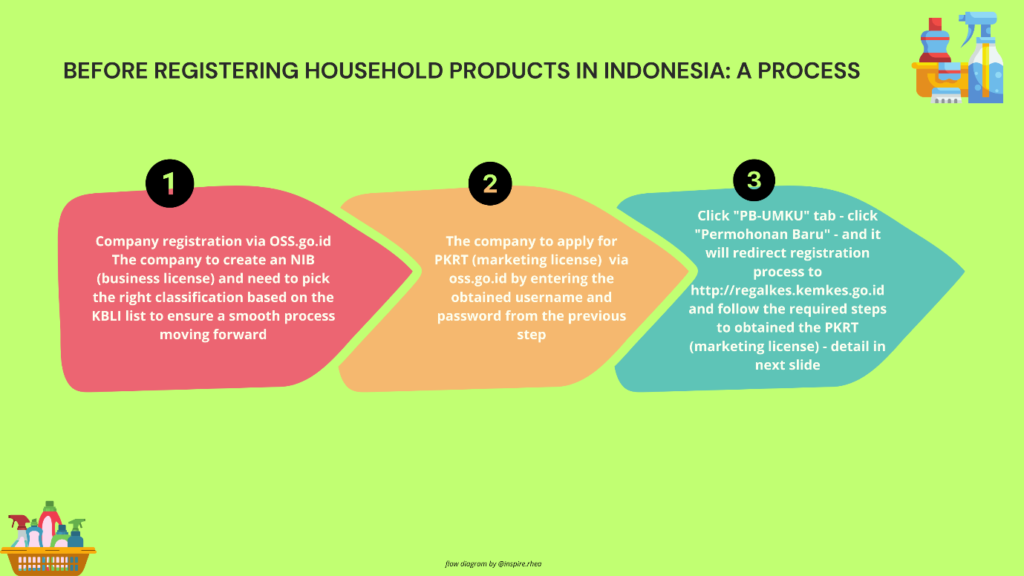
Step-by-Step Process for Household Product Registration in Indonesia
1. Company Registration
Businesses must first register their company on the OSS.go.id platform:
- Obtain a Business License (NIB).
- Ensure the business classification aligns with the KBLI (Indonesia Standard Industrial Classification) relevant to the product type.
2. PKRT (Marketing License) Application
Apply for the PKRT license through OSS.go.id, which redirects to the Ministry of Health’s registration platform, http://regalkes.kemkes.go.id.
Key Steps:
- Complete the registration form with administrative and formula data.
- Pay the registration fee after obtaining a billing code (within 7 calendar days).
- Upload the payment receipt to continue the process.
- Undergo evaluation by assessors.
- Address feedback if necessary. Approved applications receive the PKRT license, while rejected applications must reapply.
3. Product-Specific Requirements
Certain products require additional safety assessments:
- Antimicrobial Tests for disinfectants.
- Fluorescence Tests for cotton-based items.
- Absorbency Tests for baby diapers.
Costs and Timelines
The cost and processing time depend on the classification of the product:
| Product Class | Timeline | Fee |
| Class 1 | 8 working days | IDR 1 million |
| Class 2 | 8 working days | IDR 2 million |
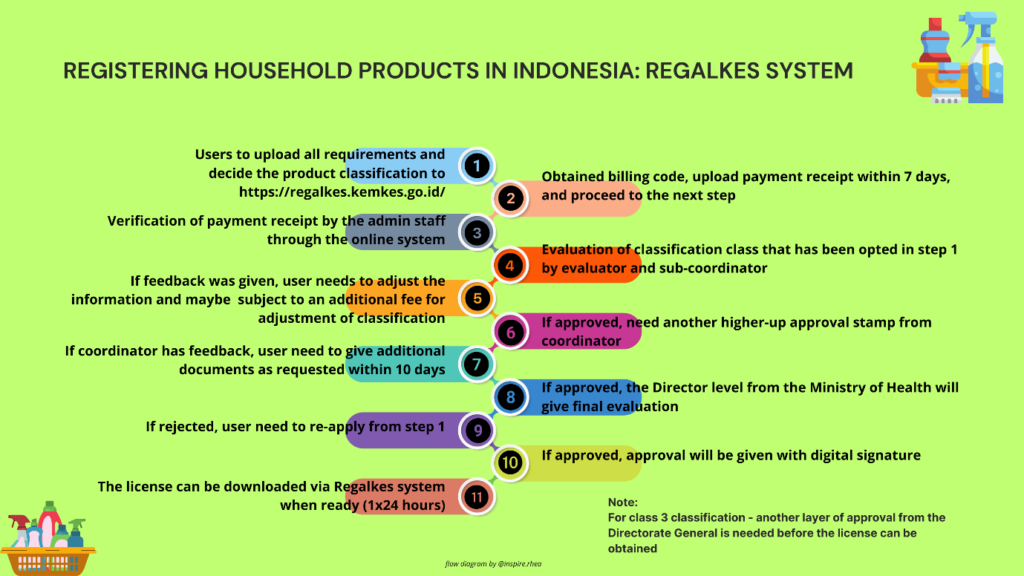
Required Documentation
1. Administrative Data
- Business License (NIB) aligned with the correct KBLI classification.
- Proof of brand ownership or partnership.
- Authenticity and integrity statements for submitted documents.
2. Formula Data
- Detailed composition of the product formula.
- Production procedures.
3. Product Conformity Document (DKP)
The DKP must include:
- Raw material and container specifications.
- Finished product inspection procedures.
- Stability and expiration data.
- Usage instructions and warnings.
- Marking and labelling information.
Labelling Requirements
Proper labelling is mandatory to ensure consumer safety and regulatory compliance. Labels must:
- Be in Bahasa Indonesia.
- Display the product name, intended use, expiration date, warnings, and usage instructions.
- Include environmental impact information for eco-friendly products.
Environmental Standards and Safety Assessments
Indonesia places significant emphasis on the environmental impact of household products. Compliance with safety assessments and sustainability practices is crucial, including:
- The use of biodegradable materials.
- Eco-friendly packaging to reduce waste.
- Non-toxic formulations to minimize environmental harm.
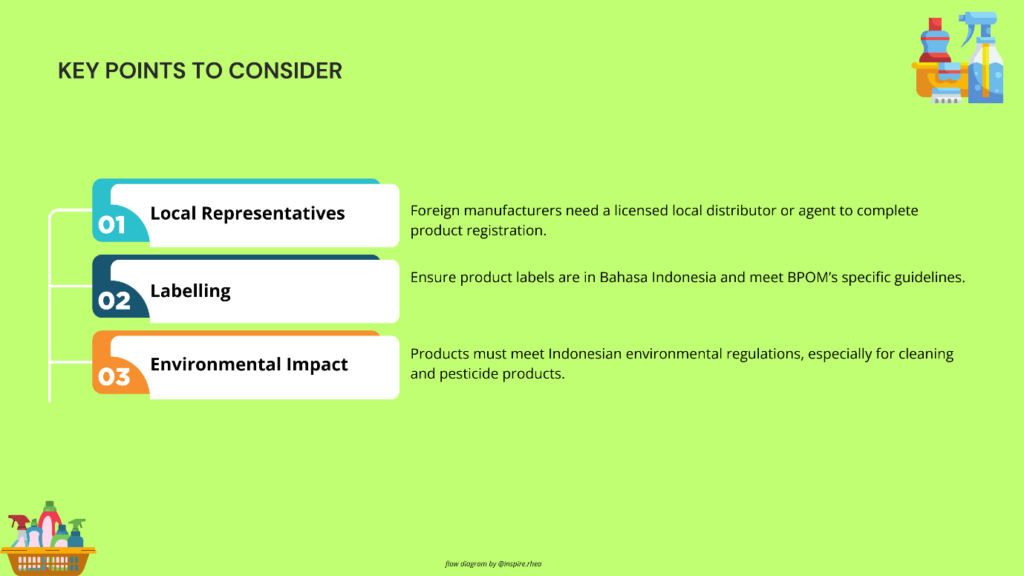
Address for Further Reference
For businesses seeking additional guidance on household product registration in Indonesia, the following addresses and platforms can be consulted:
Ministry of Health
Directorate of Environmental Health
Ministry of Health of the Republic of Indonesia
Jl. HR Rasuna Said, Kav 4-9, Kuningan, Jakarta Selatan, 12950, Indonesia
Phone: +62 21 5201590
Website: http://www.kemkes.go.id
OSS Registration
Online Single Submission (OSS) System
Jl. Gatot Subroto No. 44, Jakarta Selatan, 12190, Indonesia
Website: https://oss.go.id
Household Product Registration Platform
Regalkes Platform (Ministry of Health)
Website: http://regalkes.kemkes.go.id
BPOM (If Further Clarifications Are Needed)
National Agency of Drug and Food Control (BPOM)
Jl. Percetakan Negara No.23, Jakarta Pusat, 10560, Indonesia
Phone: +62 21 4244691
Website: https://www.pom.go.id
Conclusion
The regulatory framework for household product registration in Indonesia reflects the importance of ensuring consumer safety, product quality, and environmental sustainability. The Ministry of Health’s oversight ensures that products align with public health priorities, distinguishing this process from BPOM’s scope.
Businesses are encouraged to carefully navigate the requirements, ensure complete documentation, and consult the official platforms for assistance. By adhering to these processes, companies can confidently bring their household products to the Indonesian market while fostering consumer trust and environmental responsibility.

